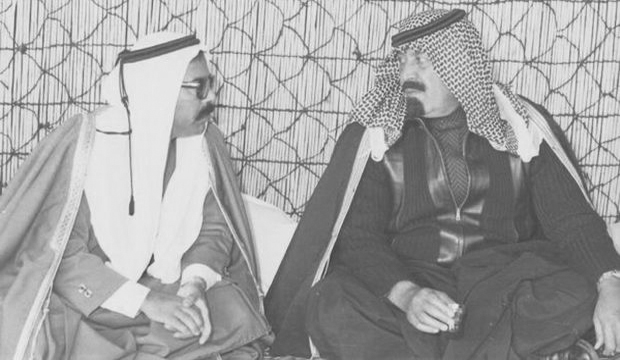
Anbar tribal chief Sheikh Hawas Al-Sadid (L) and late King Abdullah Bin Abdulaziz in Anbar, Iraq. (Asharq Al-Awsat)
Anbar, Asharq Al-Awsat—Iraqi tribal leaders and elders on Friday paid tribute to late Saudi monarch King Abdullah Bin Abdulaziz, recalling his numerous trips to western Iraq during the 1960s and 1970s when the region was known more for its hunting and falconry than unrest and the debilitating presence of the Islamic State of Iraq and Syria (ISIS).
Asharq Al-Awsat visited the restive Anbar region where some Sunni tribal leaders shared their fond memories of the Saudi monarch.
Sheikh Kanan Al-Sadid, head of the Al-Sa’ir branch of the powerful Arab Shammar tribe, said: “Firstly, let me express my sincere condolences to the House of Saud, the people of Saudi Arabia, and the Arab people as a whole, on the passing of King Abdullah Bin Abdulaziz, may he rest in peace.”
“I remember when he visited western Iraq in the 1970s. He visited us on a hunting [falconry] trip. He was an honored guest; the tribal leaders of Anbar would compete to host him,” Sadid said.
The senior member of the Shammar tribe, whose members today are fighting against ISIS in the province, praised the King’s Arab and Bedouin heritage. The late King, who was the Commander of the Saudi National Guard at the time, frequently travelled to western Iraq to meet with Arab tribesmen and indulge his love of hunting and falconry.
King Abdullah was a generous guest, Sheikh Kanan Al-Sadid told Asharq Al-Awsat. “He was usually accompanied by more than 400 vehicles and brought gifts for everybody,” he said. Hospitality is an important feature of Arab culture, and demands certain gestures of both the host and the guest.
“I remember that our tribe won the honor of hosting him and my father Sheikh Hawas ordered more than 100 heads of cattle to be prepared for a massive feast,” he said.
The Anbar tribal Sheikh also praised King Abdullah’s personal charisma and charm. “I remember that he would speak to everyone about everything. He had a good memory and would never forget your name, even if you hadn’t seen him in years,” Sadid said.
“He was always courteous and sure to thank everybody. He had good relations with all the tribes of the region, from the Arab Maghreb [North Africa] to the Mashriq [Levant],” he added.
While King Abdullah would bring gifts and presents to the region’s poor, Anbar’s wealthy and well-connected were not left out. “He gifted me with a luxury car during one visit. I still have it today,” the Shammar tribal chief proudly told Asharq Al-Awsat.
Sadid expressed sadness and grief over the late King’s passing, and praised his successor King Salman, saying that he possesses the wisdom and leadership skills to continue Saudi Arabia’s march forward.
“We have high hopes for King Salman, particularly as he has broad relations and wisdom that makes him a worthy successor to King Abdullah,” he added.
Sheikh Kanan Al-Sadid is not the only Anbar tribal leader with fond memories of the late Saudi monarch. Sheikh Rafi Al-Fahdawi, head of the Albufahd tribe, also recalls King Abdullah’s visits to the region.
“He was a generous man by any and all meaning of the word,” he told Asharq Al-Awsat.
The pro-government Albufahd tribe is currently leading the fight against ISIS in Iraq’s western-most province and Fahdawi has made numerous calls for greater Arab and international military assistance in the fight against the jihadist group. His recollections of King Abdullah are even more poignant in light of ISIS’s ongoing presence in the region.
“He [King Abdullah] would always call for us to stand together and unite, saying that we are brothers and that we must always serve our people,” he said.
Fahdawi confirms that Anbar’s tribes would compete to host the late Saudi monarch, but he dismisses a question about which Anbar tribe most often hosted King Abdullah’s falconry trips.
“He was very beloved and had strong relations with all tribal leaders in Anbar and across Iraq,” he said.
While Sheikh Ali Al-Faris Al-Dulaimi, a senior member of the powerful Dulaim tribe, told Asharq Al-Awsat: “We would rejoice whenever King Abdullah came to visit us during falconry season, which was his favorite hobby, and every tribe would look forward to seeing him.”
Al-Anbar, today under the control of ISIS, is no longer a center of Arab falconry or hunting; its tribal fighters are more concerned with hunting ISIS than anything else. But what is certain, from speaking to the tribal sheikhs leading that fight, is that Saudi King Abdullah will be sorely missed.
